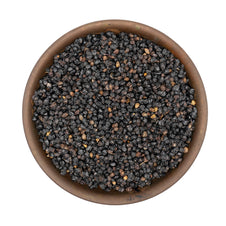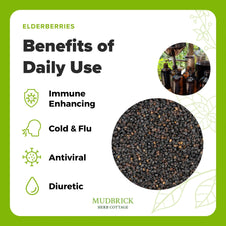











Elderberries
260 reviewsElderberries
260 reviews- In stock, ready to ship
- Inventory on the way
Check out our Elderberry Syrup Recipe!
Used throughout history for its medicinal properties, in ancient Greece, Hippocrates referred to the elderberry as a “medicine chest” for its wide array of health benefits.
Elderberries are also traditionally used for their culinary successes. Packed with nutrients, elderberries are used in a wide range of dishes but primarily in preserves, baking and drinks.
The following medicinal properties are commonly found in elderberries:
Antiviral – Elderberries have been shown to reduce the severity of symptoms of the flu virus and common cold by blocking the virus from entering the body's cells. This is also a safe remedy for children.
Immune enhancing – Elderberries can be taken regularly through the cold and flu season to enhance the immune system.
Diuretic – A popular remedy for those who suffer from water retention, elderberry can act as a natural diuretic that promotes urination.
Laxative – When ingested, elderberry can have a laxative effect to relieve constipation.
Diaphoretic – Elderberry acting as a diaphoretic promotes sweating which can help to detoxify the body of unwanted toxins and promote weight loss.
Mild analgesic – Elderberry has historically been used for its ability as a pain relief against symptoms including sinus, muscular and nerve pain.
Anti-inflammatory – Functioning as an anti-inflammatory, elderberry can relieve against inflammation caused by sore throats and joint pain.
Antihistamine – Elderberries ability to fight against cold like symptoms make it a powerful agent against seasonal allergy symptoms including sinus and nasal congestion.
Antioxidant – The powerful elderberry is known to contain polyphenols, a compound with antioxidant properties that have been proven to improve the overall immune system and promote better health.
Culinary
Throughout history, elderberries have been a popular culinary ingredient. Popular elderberry recipes include jams, syrups, liqueurs and pies. The rich flavour of elderberries makes them ideal for mixing with other fruits, including apples, pears and plums.
Other uses
Elderberries are often used in beauty products for their ability to promote softer skin and are a particularly popular ingredient in soaps. Their deep rich colour can also add to the appearance.
Uses and preparations
Decoction: A cup of immune-boosting elderberry tea if drunk regularly can help fight against cold and flu symptoms. Add 1-2 tsp of dried elderberries to two cups of water and boil for up to 15 minutes before straining. Honey can also be added as a natural sweetener to your elderberry tea.
Syrup: If you prefer to enjoy elderberry for its health benefits in a syrup form, make a decoction beforehand that can then be strained and mixed with honey. This is one of the easiest methods to enjoy a daily spoonful of elderberry syrup that will last for up to one month in the fridge.
Tincture: To make a tincture that will last up two two years for use to support your immune system, boil dried elderberries in water, (see decoction described above), strain and mix with vodka.
Poultice: An elderberry poultice when applied to the skin can help relieve discomfort from haemorrhoids or itching.
Soups and smoothies: Once cooked, elderberries can be strained and blended into a range of dishes and are a brilliant ingredient in chilled soups and smoothies.
Precautions
Although there are no known side effects of eating cooked elderberries, if consumed raw, elderberries can lead to nausea, vomiting and diarrhea.
Because elderberries can increase the activity of your immune system, it is best to avoid them if you suffer from an autoimmune disease, including multiple sclerosis, lupus and rheumatoid arthritis.
All information provided on this website is for informational purposes only. Please seek professional advice before commencing any treatment.
















